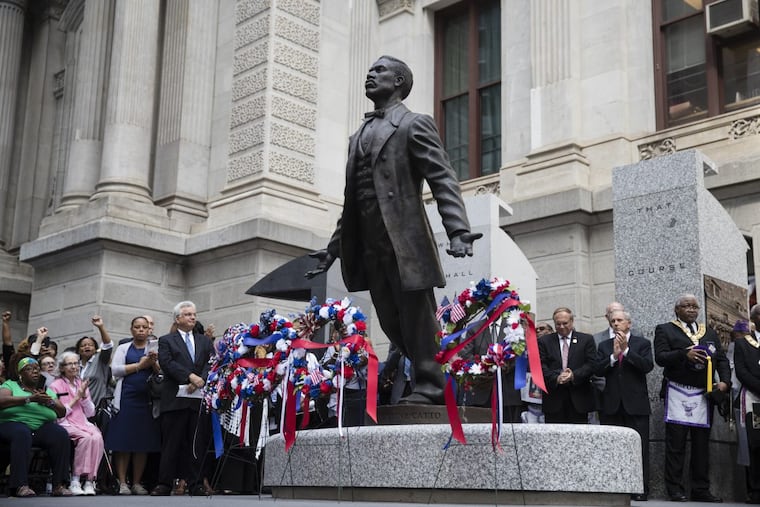Continue the fight for transit equity, started by Octavius Catto and Rosa Parks | Opinion
Public transportation is a community justice issue. All neighborhoods have a right to an inclusive transportation network connecting their communities to jobs and amenities.

The woman best known for refusing to give up her seat was not afraid to take a stand.
On Dec. 1, 1955, Rosa Parks stayed seated when a Montgomery City Lines bus driver ordered her to surrender her seat in the “colored section” to white passengers after the “whites-only” section was full. Her arrest was the rallying cry for the Montgomery bus boycott led by the Rev. Dr. Martin Luther King Jr. and established her legacy as a civil rights icon.
Here in Philadelphia, public transit also served as a civil rights battleground. Nearly 100 years before Rosa Parks’ historic bus ride, Octavius Catto and others, including his fiancée, Caroline LeCount, led a movement to desegregate Philadelphia’s streetcars.
That struggle for better transportation systems continues today. Fair and accessible public transit is a civil right that we must continue to fund and fight for.
During Black History Month, Clean Air Council and its Philadelphia Transit Equity Day Coalition partners celebrated the accomplishments of Parks and Catto in the fight for equality. Our efforts culminated in an event on Saturday celebrating Catto’s 180th birthday and calling on communities and lawmakers to create a better public transit system for all riders.
Parks and Catto understood the real and symbolic power of transit systems to create and support a better, more just society. A strong and just transit system creates good jobs. It protects our planet and our public health. It supports racial and social equity. It makes transportation affordable and reliable. Yet even as we celebrate progress, we recognize we still have a long way to go.
Public transportation is a community justice issue. All neighborhoods have a right to an inclusive transportation network connecting their communities to jobs and amenities.
Public transportation is a workers’ rights issue. The people who build our infrastructure, operate and maintain transit systems, and get us to our destinations deserve safe workplaces, fair compensation, and the right to organize for better conditions.
Public transportation is a climate change issue. The American Lung Association gave Philadelphia’s air quality an “F” rating last year. Pollution from ground transportation contributes to asthma and life-threatening respiratory conditions. A comprehensive mass transit system run on clean, renewable energy is essential to the sustainable future of our city, our society, and our planet.
Supporting and advancing a better public transit system takes proactive work on the part of our elected officials — and consistent pressure from the public. We can begin that work now.
Locally, we can work toward greater funding for SEPTA. The Philadelphia region provides only 11 percent of SEPTA’s funding. Meanwhile, the Boston, New York, and Chicago metropolitan areas all provide far more regional funding for their transit systems. Those governments understand the value of regional public transit and are willing to fund it. The regional governments of Southeastern Pennsylvania must find the means to support our own transportation priorities rather than over-relying on finicky funding from Washington.
At the state level, Gov. Tom Wolf must prioritize public transportation and infrastructure in his second term. Meanwhile, state lawmakers must proactively address threats to transportation funding, including a lawsuit seeking to prevent turnpike revenue from being used to fund mass transit.
These bold policy changes will not be accomplished overnight, and there is plenty more to be done. That’s why Clean Air Council has worked with the Philadelphia Transit Equity Day Coalition to champion public transit equality all month long.
These efforts must continue. A better public transportation system will improve the lives of everyone in our great city. It’s worth fighting for.
Joseph Otis Minott is executive director and chief counsel for Clean Air Council.